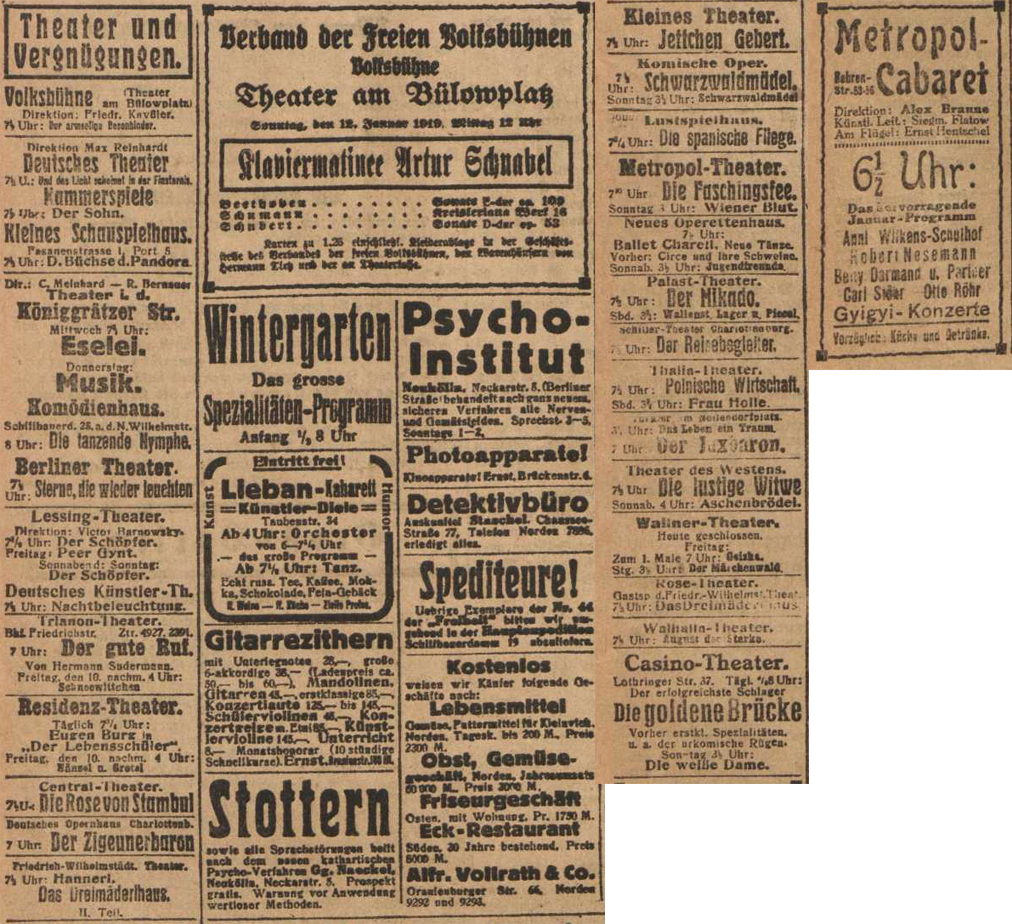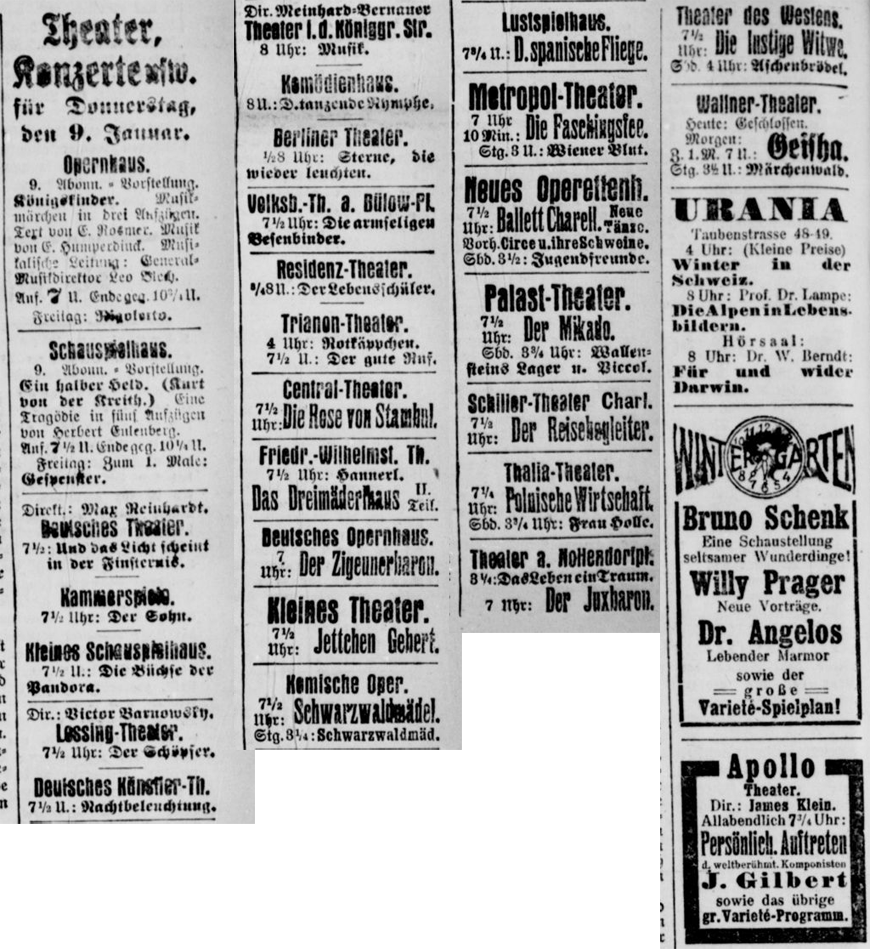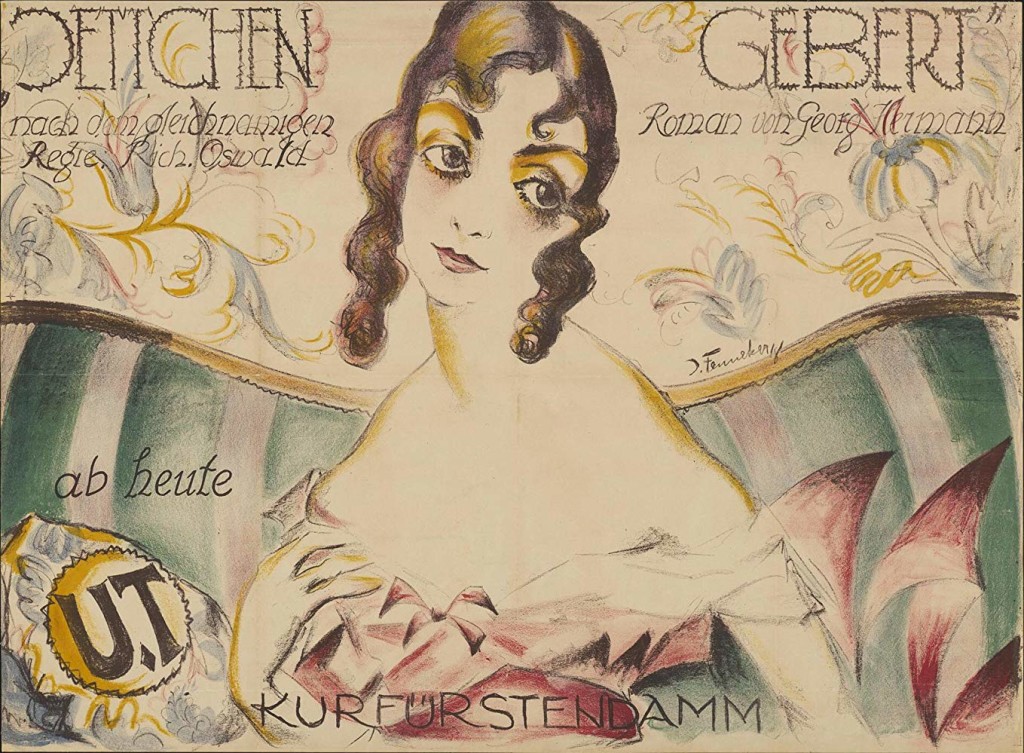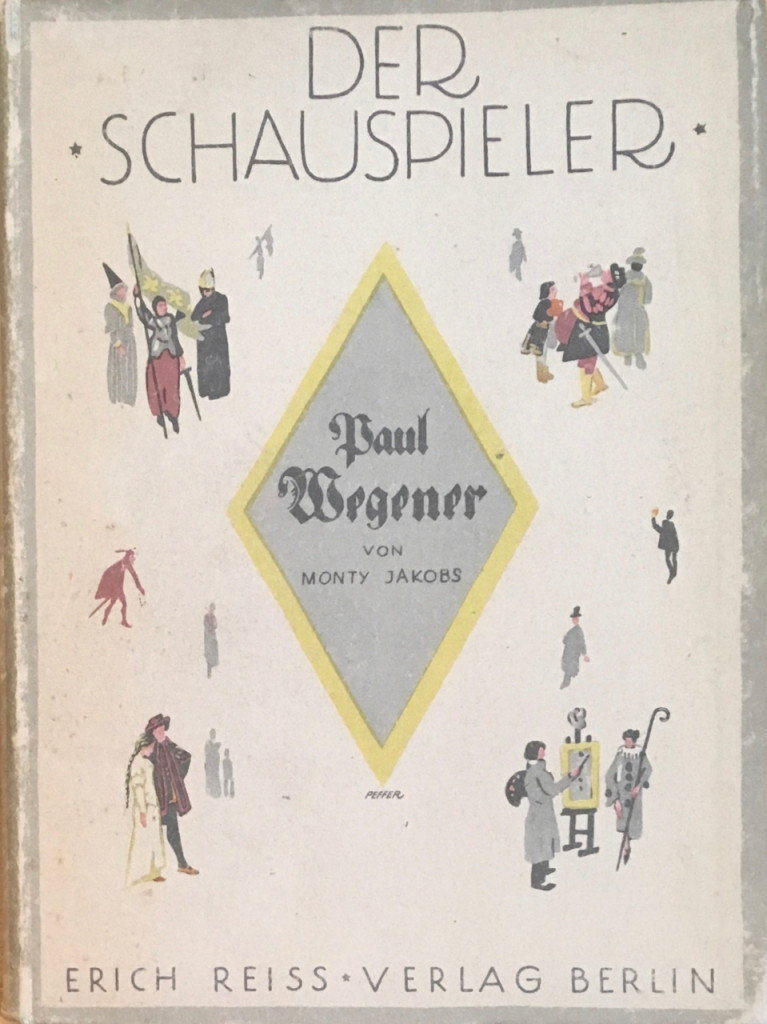Thursday, 9 January 1919
Negotiations between the government and the protesters are failing. The government has issued a call to arms, offering payment to citizens willing to join defence corps and “protect the sacred order in Germany, particularly in Berlin.” The uprising is on the brink of being violently quashed. But, as ever, the theatres carry on. Perhaps fewer people went to see shows, but the shows went ahead regardless. Here’s the listing from Freiheit (Vorwärts still being occupied):
And from the Berliner Börsen-Zeitung:
Today will be a relatively short post, perhaps mercifully: lots of repeats in this schedule! The Staatstheater is back to Ein halber Held, which we had encountered on Monday, when it had its premiere (this is something worth noting: a show opens, then disappears for a few days before it comes back. This still happens in contemporary German theatres!). They’re also announcing another premiere for Friday: Ibsen’s Ghosts! Reinhardt’s theatres continue with their en bloc runs of Tolstoy (at the Deutsche Theater) and Wedekind (at the Kleine Schauspielhaus), but at the Kammerspiele, there’s a new title: Der Sohn. (A few words about that one below.) Elsewhere, we get more fairy tale shows in the afternoon, and another matinee classic: the first two parts of Schiller’s massive Wallenstein-trilogy, Wallenstein’s Camp and The Piccolomini at the Palest-Theater.
At the Kleine Theater, we have a new title: Jettchen Gebert. An adaptation of Georg Hermann‘s bestselling 1906 novel by the author himself, it had its first ever production at the Kleine Theater in 1913; whether it stayed in rep for six years or was revived after the novel was made into a film in 1918, I don’t know. The production starred Paul Bildt, yet another emergent major figure who would remain a staple of the Berlin theatre world throughout the Weimar years and beyond. Hermann’s is a tragic story: a prominent German-Jewish novelist, he fled from the Nazis in 1933, but not far enough: he was arrested in Holland in 1943, was deported, and died at Auschwitz.
Remember Fritz von Unruh’s Ein Geschlecht the other day? Der Sohn, by Walter Hasenclever, on offer at the Kammerspiele on 9 January, was the only other “Young Germany” production to make it into the regular repertory. Unlike Unruh’s play, it was quite successful, being performed 44 times. It probably benefitted from its rather more prominent cast: there was Paul Wegener, prominent enough to have a (small) book written about him a year later.
Among the others, Ernst Deutsch and Werner Krauss were well on their way to stardom. Paul Graetz would soon be one of Weimar Germany’s most celebrated comedians and cabaret performers. And the author himself acted in the show, too. Der Sohn is one of the key Expressionist plays (and Deutsch, at this point in his career, was a key Expressionist actor). Expressionism was almost over in Berlin by 1919, but not quite: Hasenclever’s play is one of a handful of clear markers of the movement’s lasting presence and impact.
What else? Two bits of Orientalism in popular entertainment: the Palest-Theater’s The Mikado (not the first time the Gilbert and Sullivan opera appears in these listings, but I didn’t have space and time to mention it before) and an announcement for an upcoming premiere at the Wallner-Theater, closed today in preparation for that opening: a show called Geisha. We’ll see tomorrow if anything can be discovered about that.
And in Freiheit, in the shape of a large display ad, a helpful reminder that the Volksbühne was not just an institution dedicated to making “serious” theatre available to everyone, but had a broader cultural mandate: on 12 January, they would host a piano recital by Arthur Schnabel. Yet another major German artist of Jewish origin, he, too fled the country in 1933. His recordings of two of the sonatas he performed at the Volksbühne on 12 January 1919 are available online:
Beethoven, Piano Sonata in E Major, Op. 109
Schubert, Piano Sonata in D Major, Op. 53
- Click to email a link to a friend (Opens in new window)
- Click to print (Opens in new window)
- Click to share on Facebook (Opens in new window)
- Click to share on Twitter (Opens in new window)
- Click to share on Tumblr (Opens in new window)
- Click to share on LinkedIn (Opens in new window)
- Click to share on Reddit (Opens in new window)
- Click to share on Pinterest (Opens in new window)
Recent Comments
- Die Berliner Volksbühne: Ein Zentrum für politisches und experimentelles Theater - Kunst 101 on What’s so special about German theatre: Part 1
- My Homepage on Shakespearean Mythbusting I: The Fantasy of the Unsurpassed Vocabulary
- Premodern Performance-based Research: A Partial Bibliography – Alabama Shakespeare Project on My Trouble with Practice-as-Research
- Premodern Performance-based Research: A Partial Bibliography – Alabama Shakespeare Project on Where is the Theatre in Original Practice?
- Alex on Steven Moffat, Sherlock, and Neo-Victorian Sexism
Archives
- November 2021
- April 2020
- March 2020
- October 2019
- January 2019
- December 2018
- November 2018
- October 2018
- March 2018
- February 2018
- January 2018
- July 2017
- May 2017
- March 2017
- November 2016
- October 2016
- September 2016
- August 2016
- June 2016
- May 2016
- January 2016
- December 2015
- November 2015
- October 2015
- September 2015
- August 2015
- July 2015
- June 2015
- May 2015
- February 2015
- January 2015
- November 2014
- October 2014
- September 2014
- August 2014
- July 2014
- May 2014
- April 2014
- March 2014
- February 2014
- January 2014
- November 2013
- October 2013
- September 2013
- August 2013
- July 2013
- May 2013
- April 2013
- March 2013
- January 2013
- December 2012
- November 2012
- October 2012
- September 2012
- August 2012
- July 2012
- April 2012
- March 2012
- February 2012
- January 2012
- December 2011
- November 2011
- October 2011
- September 2011
- August 2011
- July 2011
- June 2011
- May 2011
Copyright

Holger Syme's work is licensed under a Creative Commons Attribution-NonCommercial 3.0 Unported License.Images may be reused as long as their source is properly attributed in accordance with the Creative Commons License detailed above. Many of the photos here were taken at the Folger Shakespeare Library; please consult their policy on digital images as well.





